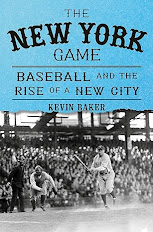Or at least “a brilliant mistake,” as The Boss sings?
All those who love truth, honesty, and the American Way (or “a Better Tomorrow,” I guess), can be happy to see the Houston Cheating Hearts dispatched again this autumn without another ring.
But the ultimate failure of the Asterisks was all-too-typical of how expansion teams of every stripe have fared since major-league baseball first decided to embrace the expanding universe in 1961.
Nearly half of all MLB teams now—14 out of 30—are expansion teams. And pretty much every one of them has been a flop. Between them, in 650 seasons, they have managed to win just 28 pennants and 12 World Series.
The hard fact is that not a single expansion franchise has an overall winning record.
Consider (years played, and pennants and World Series won, in parentheses):
Los Angeles Anaheims of Disneyland: .499 (61,1-1)
Houston Colt .45s/Astros: .498 (60, 4-1)
Toronto Blue Jays: .496 (45, 2-2)
Montreal Expos/Washington Nationals: .487 (53, 1-1)
Arizona Snakes: (.486, 24, 1-1)
Tampa Bay Deviled Eggs: .483 (24, 2-0)
Seattle Pilots/Milwaukee Brewers: .483 (53, 1-0)
New York Metsies: .480 (60, 5-2)
Kansas City Royals: .479 (53, 4-2)
Washington Senators/Texas Rangers: .476 (61, 2-0)
Seattle Mariners: .472 (45, 0-0)
Colorado Rocky Mountain High: .470 (29, 1-0)
San Diego Padres: .462 (53, 2-0)
Florida/Miami Marlins: .461 (29, 2-2)
Ouch! Am I right?
And this only begins to skim the surface of just how bad these clubs have been for how long.
In 45 seasons, nearly half-a-century, Seattle has never even made it to the Fall Classic. In 29 years, Miami has never finished first or won as many as 100 games.
None of these teams has ever won more than 2 World Series. None has ever won more than 5 pennants—something the Mets accomplished only by dint of their record-low, 82 wins for a pennant winner in 1973.
And yes, the ever-expanding number of divisions and playoff rounds has kept the record from looking even worse. By my calculations, 8 of those 28 pennants and 4 of the 12 World Series were won by wild-card teams.
Only 12 times—though I could be wrong on this—have these 14 teams finished with the best records in their leagues.
In other words, out of a combined 650 seasons, these teams have averaged 1 pennant every 23 years, 1 World Championship (and best long-season record) every 54 years.
I ask you, ladies and gentlemen of the jury, what was the need for this sort of collective fan torture?
And the evidence is pretty clear that many fans just gave up on these new Calibans of baseball. The last three baseball franchises to move, let’s not forget, were all expansion teams—not to mention at least 7 name changes, innumerable uniform experiments, and much extorting of local taxpayers for publicly funded stadia, that has gone on to try to keep these losers from going belly-up.
Is it any wonder that many of these clubs have an identity crisis?
Wouldn’t we have all been better off if the majors had just consented to the formation, over the years, of two new, 8-team leagues?
Then, instead of all this endless wild-card nonsense, we could have just had another round of play between true league champions. The AL-NL World Series, say, and the Continental-Federal League World Series, followed by the All-Galactic Universal Extravaganza Showdown. Or something.
Instead of all those years of futility, fans could have enjoyed winning all sorts of genuine pennants, championships—and just plain games—against more genuine competition.
And we who follow the Original 16 would have seen more titles, too, along with more games against our traditional rivals.
A more logical course would have also meant preserving new markets for new teams. That would have meant no heartbreak in Brooklyn, or Harlem.
Boston fans could’ve enjoyed seeing Henry Aaron’s career. Philadelphia could’ve had the Swingin’ A’s, weird as that may sound. Hell, we could still have the weird old St. Louis Browns!











































10 comments:
The Yankees have 2 pennants and 1 title in the last 20 years.
Did we become an expansion team at some point and I missed it?
I heartily agree. You didn't even mention how watered down the talent is. Half of the players we suffer through watching would be playing AAA or Pacific Coast League or AA. Or lower. (The Pacific was a damn good league, btw. Some of those guys didn't want to leave the coast, so they really didn't care too too much if they didn't go to a major league team.)
Anyway, I'm willing to have the Dodgers in LA, even though they weren't dodging streetcars. And the Giants in Frisco, I guess. The west deserves some teams.
But if MLB capped the number of teams at 10 and 10, and allowed franchises to move, it would be a much better game. This is stupid. Let the NBA and NHL put teams in Bumfuck. I think baseball would gain fans through quality and rivalries.
So there.
But at least there's been lots of general winning, Zach. Not so much with the newbies. Even when "new" is 60 years old.
Thanks, JM. I agree. The old PCL was the greatest loss of MLB's idiotic ravaging of the old minor leagues—though the loss of the International League, the American Association, and others come close.
And as you say, the PCL for a time was Triple-A-plus, and some guys just preferred to stay and play out there. It's really a little surprising that it DIDN'T become its own major league...
I'm all for those other cities getting their own major-league teams. It only made sense, as our population grew and shifted.
But if baseball had just put them in their own leagues, it all would have been much more fun and much more competitive. You know, I thought the NHL—of all institutions—actually had a pretty good idea when they first expanded by putting all 6 of the new teams in their own division.
My idea would've been to go even further. Start off with something like the Continental League that was basically just used to push the established bigs into expanding, but could have been a fine idea on its own. All those fans could've had real hopes on their own, and we could have avoided having to watch games in the Tampa Dome, or whatever it's called.
A different perspective:
For many years, my wristing/editing/publishing career was focused on one industry -- a construction trade. I'll omit which one, but it requires knowledge, skill, and ability (at the very least) to do this work. And if the people doing the work make mistakes, it puts at risk the health-safety and even the lives of the ultimate occupants of the buildings built.
One event I attended was a dinner, in NYC. Long story, but I ended up sitting next to an old veteran workman in this industry. He also did (at night) training of apprentices in the field. He had been in the field 43 years. In my experience as a writer, if someone with that much experience is willing to talk with you, you should STFU and just listen!
He opened my eyes. He basically said this: "The skilled guys we're training as apprentices and turning into journeymen today aren't close to being as knowledgeable as those (skilled tradesmen) who I worked with when I started out" -- decades earlier.
I don't know if "it's not as good now as it was then" is prevalent everywhere. It is at least in baseball (Hoss is right) and the skilled trade I covered and was associated with for decades. My friend who is an avid football fan frequently laments all of the changes in the NFL.
AND: From my limited reading about Ancient Greece, the poet Hesiod (lived in 8th century BCE) included in his poems laments about how great things were several hundred years earlier.
MY POINT: Maybe things just deteriorate over time, naturally (as in, maybe, American democracy?). Or maybe those of us who have been around for a time have some kind of golden memory of the way things used to be (or could be now) . . . a memory that's part fact and part wishful remembering.
If you want to concretely document "wishful remembering," see Zachary A's comment at the top of this thread. We NYY fans think our team is quite something, but it barely has performed as well as an expansion team -- for 2 decades.
You have a point, Joe. But I do think fewer teams would increase the general quality of play and rid us of the not ready for prime time players who clog most rosters. Maybe all. And that's something I would love to see.
I'm surprised one of the sports leagues hasn't put a team in Schenectady. Sure is a lot of space there to build an arena or stadium nearby. And it can draw fans from as far as Saratoga and Glens Falls! Even Selkirk!
Good points all around, Joe. And I especially agree with listening to people who have skills I don't have (which means almost everybody). Listening well, I think, is one of the hardest—but most important—things for a writer to learn to do.
It's a funny thing about the whole, "Things aren't what they used to be" lament. It has so often been so overdone that we tend to doubt it on its face.
I know that in baseball, the earliest known example of that was one "Old Pete" O'Brien, a player on the Brooklyn Atlantics, who told a reporter that they just didn't play baseball the way they used to 8-10 years before. He was speaking in 1868!
BUT...
BUT, the fact that people like me too often tend to miss "the good old days," when we're really missing our youth...doesn't mean that things DON'T decline and get worse. They really do, in all sorts of ways.
In baseball, there is a legitimate debate to be had about whether keeping guys in the minors longer to learn various skills is better than bringing them up to get in great years when they're at their youngest and quickest.
But to play the game the way it is played today...it's just not working. And it's not working in the most fundamental way: people are bored and don't want to watch it. When you're a spectator sport, that's the bottom line.
And JM, just to clarify, I think adding major-league teams was a necessary and good idea. They just should have been put in their own, separate leagues so both players and fans could enjoy some winning—and so we could have more fun playing old rivals.
Too late to put that cat back in the bag. But not too late to make the game better!
Post a Comment